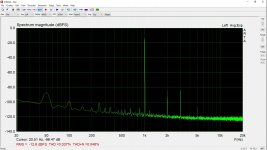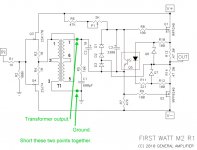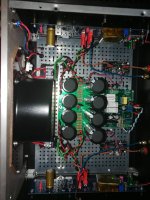My plan, once my connectors arrived, I will get one (+1) M2X daughter card
without components to make up a jig. After I removed the main amp board from the heat sinks, I will
1.) Solder males (x4) to the sacrificial board as close to 90 deg. with the aide of a protractor or carpenters ruler (if applicable).
2.) Attached the females to the males (x4).
3.) Test fit to the main amp board, already disconnected to the sinks, by inserting the other ends of the female sockets to the main amp board and checking if the pins are perpendicular to the amp board surface.
4.) Pre-solder (slight amount) the females to the main amp board from the top, OR use rubber bands to apply pressure to the two boards with the pins in-between, pins are flushed to the PCB's.
5.) Double checked with a pro-tractor and a ruler (in mm) making sure that 1/2 of the the triangle formed by the plane between 2 pins equals hypotenuse as square root of 2, adjacent is 1, and opposite is 1.
6.) Finally, apply solder to the females from the bottom of the main amp board side permanently .
Voila! Time to congratulate myself for a job well done.
The +1 card is for fitting and soldering females, using the already finish test jig (with males) as a guide for other boards needing males to avoid soldering inside the amp later on.... I think.
Can you just use ~1inch 4-40 or M3 screws to hold the board in place diagonally while the other two holes diagonal contain the connectors to be soldered? Remove the screws and put the other pair of connector to be soldered in place. All future board will be based on that reference setup.
I'll try if I can make it work the way you described it when the connectors arrive. Thank you!
My fight with noise continues ....
My fight with noise continues ....
I checked the amplifier using the spectrum analyzer of the ARTA program.
This is the ripple for Ishikawa and Mountain View 1W for the 8R load.
I measured it with my notebook's sound card.
As I wrote earlier, the MV noise is audible in the loudspeaker only close up.
In the M2 thread I found advice to connect Edcor's output to ground. If the noise subsides, it is a sign that the noise is generated there.It worked for me. It's quiet when I connect the output to ground
This is to prove there is a problem with magnetic radiation of the power transformer?
Please confirm that the next step is to disassemble the toroid and check the noise?
Anyway, what else can I check?
regards Darek
My fight with noise continues ....
I checked the amplifier using the spectrum analyzer of the ARTA program.
This is the ripple for Ishikawa and Mountain View 1W for the 8R load.
I measured it with my notebook's sound card.
As I wrote earlier, the MV noise is audible in the loudspeaker only close up.
In the M2 thread I found advice to connect Edcor's output to ground. If the noise subsides, it is a sign that the noise is generated there.It worked for me. It's quiet when I connect the output to ground
This is to prove there is a problem with magnetic radiation of the power transformer?
Please confirm that the next step is to disassemble the toroid and check the noise?
Anyway, what else can I check?
regards Darek
Attachments
What are the steps you already took to work on noise? (Forgive me if this is in past posts.)
I found:
—Some daughter cards present less audible "noise" in the output than others (Norwood was the quietest over here, also my favorite—well until MJ dropped the Cedarburg on us.)
—Shielding the Edcor made the biggest difference
—Rotating the donut allowed for tuning it to the quietest position
—Ferrite core around the primaries did something
—Removing sources of noise in the surrounding environment like SMPS bricks and computers—and LED lighting had lasting effects for everything.
—I made all assessments with headphones plugged into the outputs. Inputs shorted and non shorted both ways told a story.
—I'd add a steel shield to the transformer if I was inclined to take more steps.
I found:
—Some daughter cards present less audible "noise" in the output than others (Norwood was the quietest over here, also my favorite—well until MJ dropped the Cedarburg on us.)
—Shielding the Edcor made the biggest difference
—Rotating the donut allowed for tuning it to the quietest position
—Ferrite core around the primaries did something
—Removing sources of noise in the surrounding environment like SMPS bricks and computers—and LED lighting had lasting effects for everything.
—I made all assessments with headphones plugged into the outputs. Inputs shorted and non shorted both ways told a story.
—I'd add a steel shield to the transformer if I was inclined to take more steps.
The diagram in post #5023.....if those wires are connected together the amp is probably very silent but then it will not play any music? .....you shorted the output signal of Edcor.
The noise you hear is "humming" (it is the only significant noise on Arta measurements)?
The noise you hear is "humming" (it is the only significant noise on Arta measurements)?
Ok.....I assume it was by purpose to short output of Edcor to check if noise was generated in output stage or before output stage.
As you have some 50 Hz noise on Arta measurement it is very possible that it is pickup byt Edcor from mains transformer as the "magnetic noise" will be 50 Hz.
As you have some 50 Hz noise on Arta measurement it is very possible that it is pickup byt Edcor from mains transformer as the "magnetic noise" will be 50 Hz.
The 2nd Arta graph is probably Mountain view as you have more 100 Hz noise. Mountain view is single ended as far as I remember and is probably not as good to supres ripple as Ishikawa.
The diagram in post #5023.....if those wires are connected together the amp is probably very silent but then it will not play any music? .....you shorted the output signal of Edcor.
The noise you hear is "humming" (it is the only significant noise on Arta measurements)?
Yes. I shorted edcors output to ground. Then the noise disappears. If I understand correctly, this means that this is a problem with toroid noise. I read about it in thread M2 and there was this diagram.
This is what the noise from the speaker looks like in the smartphone application
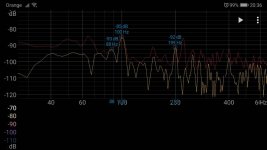
To check if the 50 Hz is from toroid transformer a good test could be to move it out of the chassis.
To get less 100 Hz noise with Mountain view you probably need a better filtering. To increase the caps may not be the solution. A better solution may be to increase the R in the CRC filter. Is your R about 0.1 ohm?
A good audio SMPS could maybe also be a solution.
To get less 100 Hz noise with Mountain view you probably need a better filtering. To increase the caps may not be the solution. A better solution may be to increase the R in the CRC filter. Is your R about 0.1 ohm?
A good audio SMPS could maybe also be a solution.
Ok. I know this is the case with MV, but no one has reported such problems here. My power supply now gives 50mVpp of ripple noise(with load).I have 0, 17 R (3x0,5R paralel) This is definitely less than a universal power supply from diyaudiostoreThe 2nd Arta graph is probably Mountain view as you have more 100 Hz noise. Mountain view is single ended as far as I remember and is probably not as good to supres ripple as Ishikawa.
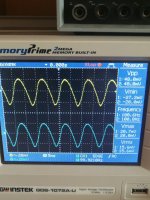
Last edited:
Many people are not that "hum sensitive"....it seems......I am....and took care of if from the beginning. It also depends of speaker sensitivity and listening distance. Most are happy if there are no audible hum noise in listening position.
I think two 24V 5A Meanwell bricks for the 2. gen ACA could solve the problem and then maybe a couple of SMPS filters which are used for the new VFET amp could be implemented also. Then you will get a completely silent M2X 🙂
I want to try this.
I have to put my ear right in the cones to hear anything with M2X monoblocks. BUT there IS as little something. More of a little buzz, than a hum. 92db speaks. Vfet was absolutely SILENT in the same system. I'm not totally convinced that the M2X mini-buzz isn't environmental. It likely is.
I have to put my ear right in the cones to hear anything with M2X monoblocks. BUT there IS as little something. More of a little buzz, than a hum. 92db speaks. Vfet was absolutely SILENT in the same system. I'm not totally convinced that the M2X mini-buzz isn't environmental. It likely is.
Last edited:
My speakers are 89dB effective so I try to fight it even though the noise is low. Ok. So it remains for me to take care of the transformer first. I understand that the test with shorted edcor does not apply to 100hz ripple?
If 100 Hz noise is generated before Edcor (e.g. in Mountain view) then it will also "disappear" if you short Edcor. Then you know it is not generated in the output stage.
Yes. It is.It looks like your trafo covers are isolated from the chassis?
Yes. It is.
The covers would be more effective if grounded.
Last edited:
- Home
- Amplifiers
- Pass Labs
- The diyAudio First Watt M2x

